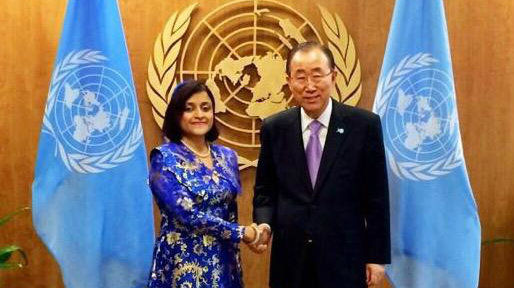Who said what? Foreign Minister’s meetings in New York
Dunya called the UN Working Group on Arbitrary Detention’s ruling on Nasheed’s imprisonment “arbitrary” in a meeting with the UN human rights chief, and sought to downplay the call by UN Secretary General Ban Ki-Moon to grant clemency to Nasheed.

03 Oct 2015, 09:00
In a meeting with the UN’s human rights chief in New York, Foreign Minister Dunya Maumoon called a UN rights panel’s opinion on former President Mohamed Nasheed’s imprisonment “arbitrary.”
The UN Working Group on Arbitrary Detention (UNWGAD) has ruled the opposition leader’s imprisonment on a terrorism charge illegal. The government claims the ruling by five independent experts is flawed and refuses to release Nasheed.
Zeid Ra’ad Al-Hussein, the UN High Commissioner for Human Rights, a vocal critic of the rushed trial against Nasheed, met with Dunya on Thursday.
She is filling in for President Abdulla Yameen at the United Nations General Assembly. The president has skipped the UNGA twice now.
Become a member
Get full access to our archive and personalise your experience.
Already a member?
Discussion
No comments yet. Be the first to share your thoughts!
No comments yet. Be the first to join the conversation!
Join the Conversation
Sign in to share your thoughts under an alias and take part in the discussion. Independent journalism thrives on open, respectful debate — your voice matters.




